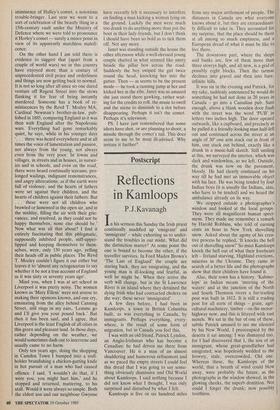Postscript
Reflections in Kamloops
P.J.Kavanagh
A few days before, I had been in Kamloops, a town in British Columbia built, as was everything in Canada, by immigrants. Perhaps everything, every- where, is the result of some form of migration, but in Canada you feel this.
I was with an old friend, Patrick Lyndon, an Anglo-Irishman who has become a Canadian: he had driven me there from Vancouver. He is a man of an almost shuddering and humorous refinement and as we paced the empty streets I could feel this dread that I was going to say some- thing obviously dismissive and Old World about Kamloops. I said nothing because I did not know what I thought, I was only surprised and disturbed by what I felt.
Kamloops is five or six hundred miles from any major settlement of people. The distances in Canada are what everyone knows about it, but they are extraordinari- ly difficult to take in. They accounted for my surprise, that the place should be there at all among so much emptiness, and a European dread of what it must be like to live there.
The downtown part, where the shops and banks are, few of them more than three storeys high, and all new, is a grid of possibly eight blocks. Then the tarmac declines into gravel and then into bare, infinite hills.
It was six in the evening and Patrick, for my sake, suddenly announced he would do something he had not done in 20 years in Canada – go into a Canadian pub. Sure enough, above a blank wooden door flush with the street was the word 'PUB' in letters two inches high. The door opened outwards, like a cupboard, and precisely as he pulled it a friendly-looking man half-fell out and continued across the street at an angle of 30° one arm stuck out in front of him, one stuck out behind, exactly like a drunk in a music-hall sketch. Still smiling at this, we surveyed the interior, which was dark and windowless, so we left. Outside, the drunk was now on the pavement, bloody. He had clearly continued on his way till he had met an immovable object with his face. He was being tended by four Indian boys (it is usually the Indians, alas, who have to be tended) and we heard the ambulance already on its way.
We stopped outside a photographer's window and looked at the local groups. They were all magnificent human speci- mens. They made me remember a remark by Harold Robbins, who told of earning cents an hour in New York shovelling snow. Asked about the agony of his crea- tive process he replied, 'It knocks the hell out of shovelling snow!' So must Kamloops knock the hell out of what their forebears left – Ireland starving, Highland evictions, miseries in the Ukraine. They came in search of a better life and the photographs show that their children have found it.
Also, their town has a history. `Kahmo- lops' in Indian means 'meeting of the waters' and at the junction of the North and South Thomson rivers a fur-trading post was built in 1812. It is still a trading post for all sorts of things – grain, agri- cultural machinery, timber – on the motor- highway now, and this is littered with vast motels. We sat in the bar of one of these, subtle Patrick amused to see me silenced by his New World, I preoccupied by the deserts it sat among: I was dismayed too, for I had discovered that I, the son of an immigrant, whose great-grandfather had emigrated, was hopelessly wedded to the frowsty, stale, overcrowded, Old one. Whereas these, the Kamloops of the world, that a breath of wind could blow away, were probably the future, as the photographs in the window showed, in the glowing cheeks, the superb dentition. Nor could I forget the drunk; now possibly toothless.


















































 Previous page
Previous page